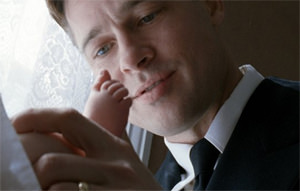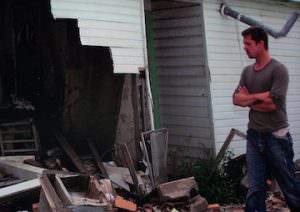‘The Tree of Life’: Terrence Malick Syndrome Strikes Again
This will not do—either as philosophy or as the conclusion of a picture that has wasted close to two and half hours of our time with its twaddling pretenses. But it is not quite the end of our concern with it. I think of it as the “Hiroshima Mon Amour” scam.
I think of it as the “Hiroshima Mon Amour” scam. You juxtapose, as the Alain Resnais movie of 1959 did, some characters going about their quotidian business—in that case a love affair—with some cosmic event—in that instance the dropping of the first atomic bomb—in hopes of granting world historical significance to the story. Such films are not truly historical narratives. That is to say, the foreground figures do not in any way interact with huge and enigmatic events. The hope is that some sort of resonance between large events and minor happenings will be established.
I’ve always thought that there’s something cheesy about films of this sort. They are attempts to impose “importance” on essentially unimportant, or at least highly conventional, occurrences—never more so than in Terrence Malick’s “The Tree of Life,” winner of this year’s Palme d’Or at Cannes, and the occasion for more critical heavy-breathing than any other film in recent memory.
It opens on a family called the O’Briens, living humbly in Waco, Texas. Dad (Brad Pitt) is a talented musician working in a dead-end job. Mom (Jessica Chastain) is loving and uncritical of his behavior in relation to their sons, which veers from the angrily stern to the waywardly affectionate. They have three rather ordinary sons. In the film’s first long sequence the O’Briens are obliged to deal with the unexpected death, as a young man, of one of the boys. Once that is managed—rather distantly it seemed to me—the movie spins off into a long passage about the creation of the world.
Volcanoes erupt. Seas crash. The cosmos takes form. A couple of dinosaurs are seen in sportive play (a very bad idea that one). What all this banging about has to do with the fate of the O’Brien family, which we witness growing steadily, without relief, into mediocrity, is not explained. Because, of course, it cannot be explained. The formation of the universe as we know it has nothing whatsoever to do with the mild malformation of this family—except possibly as a lame pun. “Nuclear” family — “nuclear” universe. Get it? The last we see of the O’Briens, Sean Penn, one of the sons, and apparently a successful, if unhappy, architect, is leading them into an end-of-days sequence—lots of folks wandering silently on a beach, getting their feet wet as they await—I guess—some explanation of existence. Which is not forthcoming, although there is a hint that the best we can do in life is to love one another as best we can.
This will not do—either as philosophy or as the conclusion of a picture that has wasted close to two and half hours of our time with its twaddling pretenses. But it is not quite the end of our concern with it. Or to put it more concisely, with Terrence Malick. He is, of course, famously reclusive and a famously slow worker. Over the course of 38 years he has made only five movies (an average of one every seven and a half years). The supposition among critics and audiences is that anyone proceeding at so ponderous a pace must be struggling to articulate truths that are at the least sublime and at most close to unspeakable. Aside from his first movie, the bleak and darkly witty “Badlands” (about a serial killer on the run with his dopily romantic girlfriend), that has not been the case. All of his subsequent efforts have been pretty, narratively empty and emotionally unengaging. You can admire his effort to find new methods of screen story telling, but it has proved impossible to involve yourself with his films at any level.
Yet, critically, no one wants to give up on Malick. He does make beautiful images—though I think they are more self-conscious intensifications of conventional screen imagery than they are highly original—and he plays the role of the dedicated artist convincingly (it is said that he spent four years editing “The Tree of Life”). This makes it extremely difficult for critics to believe that a man so devoted to his creations, so uninterested in grosses or the trappings of fame, could actually be quite an inept filmmaker.
But such is the case. Setting aside a few reviews that simply take Malick at his word, “The Tree of Life” has been largely greeted by a sort of cautious ambivalence—its manifest ambitions acknowledged, its tediousness and pretentiousness glossed over. In effect, the critics are reviewing his earnest biography, not the work at hand. But it has to be said: There is something mulish about his sophomorism, something stupefying about his work. Movies, I believe, are an essentially worldly medium, playful and romantic, particularly in America, where, on the whole our best directors have stated whatever serious intentions they may harbor as ignorable asides. There are other ways of making movies, naturally, and there’s always a small audience available for these noble strivings—and good for them, I guess. But I’m with Preston Sturges, who gave this immortal line to Veronica Lake in “Sullivan’s Travels”: “There’s nothing like a deep-dish movie to drive you out in the open.” She was speaking, of course, to a director briefly smitten with the Terrence Malick syndrome.
Your support matters…Independent journalism is under threat and overshadowed by heavily funded mainstream media.
You can help level the playing field. Become a member.
Your tax-deductible contribution keeps us digging beneath the headlines to give you thought-provoking, investigative reporting and analysis that unearths what's really happening- without compromise.
Give today to support our courageous, independent journalists.






You need to be a supporter to comment.
There are currently no responses to this article.
Be the first to respond.